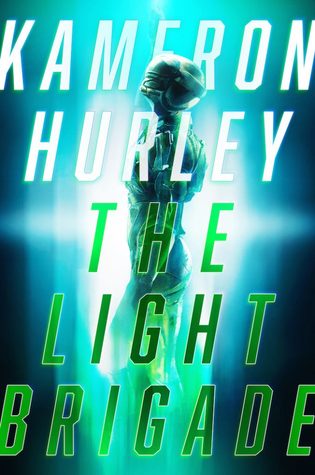- The Good: Modern take on the military scifi genre
- The Bad: Climax doesn’t feel earned; repetitive confusing timey-wimey elements
- The Literary: Nods to the classics! Un-gendered protagonist!
With her home recently destroyed, Dietz joins up as a soldier in the corporate corps to fight in the war against Mars. After intense basic training, soldiers are broken down into their individual atoms and converted to light in order to travel back and forth to battlefronts on Mars. All soldiers are affected differently by the new tech transport, but they all know to stick to the mission brief, if they survive. Dietz struggles with her memory, her sanity, and her desire to become a hero.
Nominated for a Hugo this year, The Light Bridge has a lot going on. Beginning early in the first chapter, there are immediate nods to classic science fiction stories, including Starship Troopers and The Forever War. I also find similarities to other greats, like Slaughterhouse Five and most anything by Philip K. Dick. Let me explain.
Some of the great military scifi novels are told from the vantage point of the grunts in the war, who don’t have access to the wider strategic plan, and The Light Brigade excels in this area. The torturous training and endless battles harden the recruits quickly, but they continue to fight despite the futility. Dietz loses her civilian family, only to join the corps and lose her new family and friends, one at a time, in horribly grotesque battles or transporting accidents. She follows orders, even if they seem wrong. The modern twist is that the world is run by corporations, which I think works well for the story.
Once Dietz begins making light drops, the story turns and things start getting weird. Is Dietz experiencing the battle, much less the war, that much differently than everyone else? Why don’t Dietz’s drops sync up with the platoon’s? Because Dietz never quite knows what’s real, memory, or imagination, she begins to question what this war is really about.
So what else is great about this book? The concise prose and short chapters create a fast-paced page turner. But the time-bending elements force you to pay attention. I like that the novel makes some high-level social commentary on our modern world, from climate change, to fake news, to corporate greed. Also, Dietz’s gender is unknown, which is great. Feel free to assign whatever gender you find most appropriate, then consider switching in the middle of the novel. I find this literary nugget to be a real treat.
However, the timey-wimey stuff is confusing, and the big reveal, especially by Dietz, doesn’t feel consistent with character. Dietz’s commanding officer in basic training says Dietz doesn’t have “two brain cells to rub together”, and several other characters lose their patience because smarts aren’t really Dietz’s thing. What does resonate is when Dietz stands down when commanded to shoot a bunch of innocent protesters from the neighborhood where Dietz grew up. Dietz is the emotional type. So Dietz is very confused most of the second act, and then the reveal happens all of a sudden, and the audience doesn’t see how the epiphany occurred, just that things aren’t what they seem, because Dietz figures it out.
With that said, I highly recommend this adrenaline-pumping Hugo-nominated anti-capitalist story. This is one of the most accessible military scifi books I’ve read, and a great introduction to the genre!
